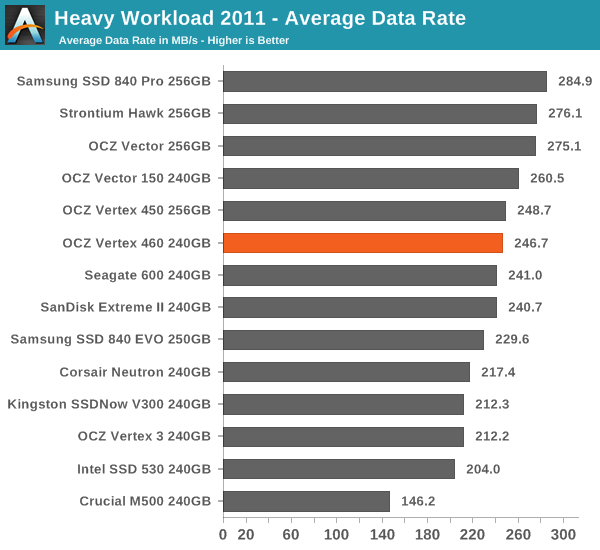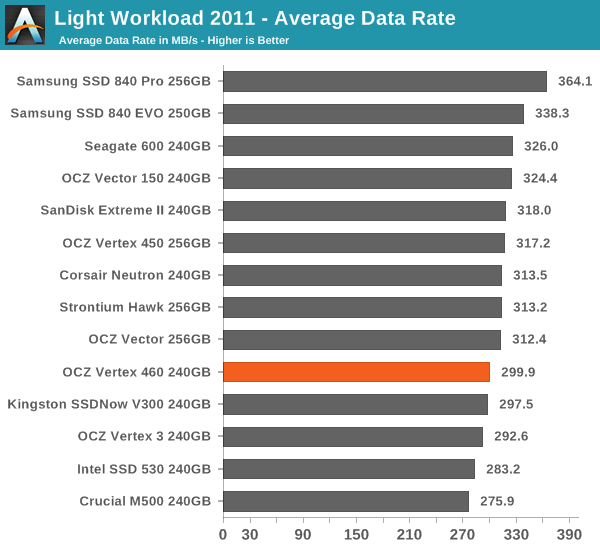OCZ Vertex 460 (240GB) Review
by Kristian Vättö on January 22, 2014 9:00 AM EST- Posted in
- Storage
- SSDs
- OCZ
- Indilinx
- Vertex 460
AnandTech Storage Bench 2011
Two years ago we introduced our AnandTech Storage Bench, a suite of benchmarks that took traces of real OS/application usage and played them back in a repeatable manner. Anand assembled the traces out of frustration with the majority of what we have today in terms of SSD benchmarks.
Although the AnandTech Storage Bench tests did a good job of characterizing SSD performance, they weren't stressful enough. All of the tests performed less than 10GB of reads/writes and typically involved only 4GB of writes specifically. That's not even enough exceed the spare area on most SSDs. Most canned SSD benchmarks don't even come close to writing a single gigabyte of data, but that doesn't mean that simply writing 4GB is acceptable.
Originally the benchmarks were kept short enough that they wouldn't be a burden to run (~30 minutes) but long enough that they were representative of what a power user might do with their system.
1) The MOASB, officially called AnandTech Storage Bench 2011 - Heavy Workload, mainly focuses on the times when your I/O activity is the highest. There is a lot of downloading and application installing that happens during the course of this test. Our thinking was that it's during application installs, file copies, downloading and multitasking with all of this that you can really notice performance differences between drives.
2) We tried to cover as many bases as possible with the software incorporated into this test. There's a lot of photo editing in Photoshop, HTML editing in Dreamweaver, web browsing, game playing/level loading (Starcraft II & WoW are both a part of the test) as well as general use stuff (application installing, virus scanning). We've included a large amount of email downloading, document creation and editing as well. To top it all off we even use Visual Studio 2008 to build Chromium during the test.
The test has 2,168,893 read operations and 1,783,447 write operations. The IO breakdown is as follows:
| AnandTech Storage Bench 2011 - Heavy Workload IO Breakdown | ||||
| IO Size | % of Total | |||
| 4KB | 28% | |||
| 16KB | 10% | |||
| 32KB | 10% | |||
| 64KB | 4% | |||
Only 42% of all operations are sequential, the rest range from pseudo to fully random (with most falling in the pseudo-random category). Average queue depth is 4.625 IOs, with 59% of operations taking place in an IO queue of 1.
AnandTech Storage Bench 2011 - Heavy Workload

The full results, including disk busy times and read/write separations, can be found in our Bench.
AnandTech Storage Bench 2011 - Light Workload
Our light workload actually has more write operations than read operations. The split is as follows: 372,630 reads and 459,709 writes. The relatively close read/write ratio does better mimic a typical light workload (although even lighter workloads would be far more read centric). There's lots of web browsing, photo editing (but with a greater focus on photo consumption), video playback as well as some application installs and gaming.
The I/O breakdown is similar to the heavy workload at small IOs, however you'll notice that there are far fewer large IO transfers. Interestingly, the 480GB drive actually comes out ahead in this case, suggesting it's more capable at light workloads.
| AnandTech Storage Bench 2011 - Light Workload IO Breakdown | ||||
| IO Size | % of Total | |||
| 4KB | 27% | |||
| 16KB | 8% | |||
| 32KB | 6% | |||
| 64KB | 5% | |||











69 Comments
View All Comments
melgross - Wednesday, January 22, 2014 - link
This site is obsessed with this company. There are so many manufacturers, and so many drives, but they keep coming back to OCZ.Kristian Vättö - Wednesday, January 22, 2014 - link
Is there a manufacturer or drive we've missed? We don't favour any OEM over another and if there's a new product we'll review it.However, a lot depends on the company's PR. OCZ has always been good at this as they approach us and provide samples under NDA prior to the launch, so the review process is smooth for us. Some companies are fairly poor at this as we always have to approach the OEM after the launch to get a sample at all.
GrizzledYoungMan - Wednesday, January 22, 2014 - link
Since you asked, there are some SSD-related reviews I'd love to see from Anandtech:1. The Sandisk X210. It promises Extreme II performance with many of the reliability features of an enterprise drive and excellent pricing.
2. 'Hybrid' RAID 5 or RAID 6 configurations, with caching software such as LSI's Cachecade 2.0 or Adaptec's I-can't-remember-right-now. I've been specc'ing out such a system and found it startling how little in-depth, useful information there is out there about what sort of SSDs are appropriate (and why) and what configurations yield good price/performance outcomes.
3. Along those lines, I'd really like to see how enterprise SSDs you've tested like the Intel DC S3500 perform in your client testing environment. It feels like your enterprise SSD testing is woefully truncated on the false assumption that no one would use enterprise SSDs in a client/workstation setting. Testing those drives more thoroughly would seem to be a much better use of your time than testing the Nth variation of whatever OCZ drive came out this week.
I hope you find this comment helpful, it's intended as constructive criticism. Still love the site!
Kristian Vättö - Wednesday, January 22, 2014 - link
This is definitely helpful. In the end we do this for you, our readers, not four ourselves or manufacturers :)1 and 3 should definitely be possible and 2 very likely too (as long as LSI/Adaptec can deliver us the samples). I'll do my best!
GrizzledYoungMan - Wednesday, January 22, 2014 - link
Awesome! Looking forward to reading those reviews.A recommendation regarding which LSI controller to choose: go for the 9271-8i. At this point, it's the natural choice for most new system builders because it offers better performance (and Fastpath enabled by default) as the 9266 or 9261 for roughly the same price.
Also, if LSI gives you any trouble about providing samples, just tell 'em that some random guy from the internet who calls himself grizzledyoungman wants to see that review. Should do the trick.
romrunning - Thursday, January 23, 2014 - link
1) I also would like to see more tests of SSDs in RAID arrays (RAID-5/6/10 - not just 0/1).2) I would love to see some enterprise controllers tested like the Adaptec ASR-72405 and ASR-8885.
3) In addition to that, let's test more enterprise SSDs (like HGST's SSD800MM and the DC3700).
4) For SMBs who want to build a fast server with awesome I/O, it would be good to see how these SSDs perform in a database server or as a virtual host server.
lever_age - Wednesday, January 22, 2014 - link
Yeah, when products don't get reviewed, it's usually time to start bugging the company PR teams. The bigger and reputable sites have enough work already reviewing the stuff that gets sent to them by the brands that do have their acts together (and want things reviewed).JDG1980 - Wednesday, January 22, 2014 - link
I don't think it's good practice to rely upon free review samples. How do you know the company isn't cherry-picking? I believe it would be best to do what Consumer Reports does with all the items it tests: buy anonymously off-the-shelf.blanarahul - Wednesday, January 22, 2014 - link
Cherry picking MLC SSDs affects performance? That's new. Or maybe, you are wrong.chrnochime - Wednesday, January 22, 2014 - link
How is cherry picking NOT useful for better test results? That's what the definition of cherry picking is. Sounds like you either are ignorant of that fact or are defending OCZ for whatever reason.